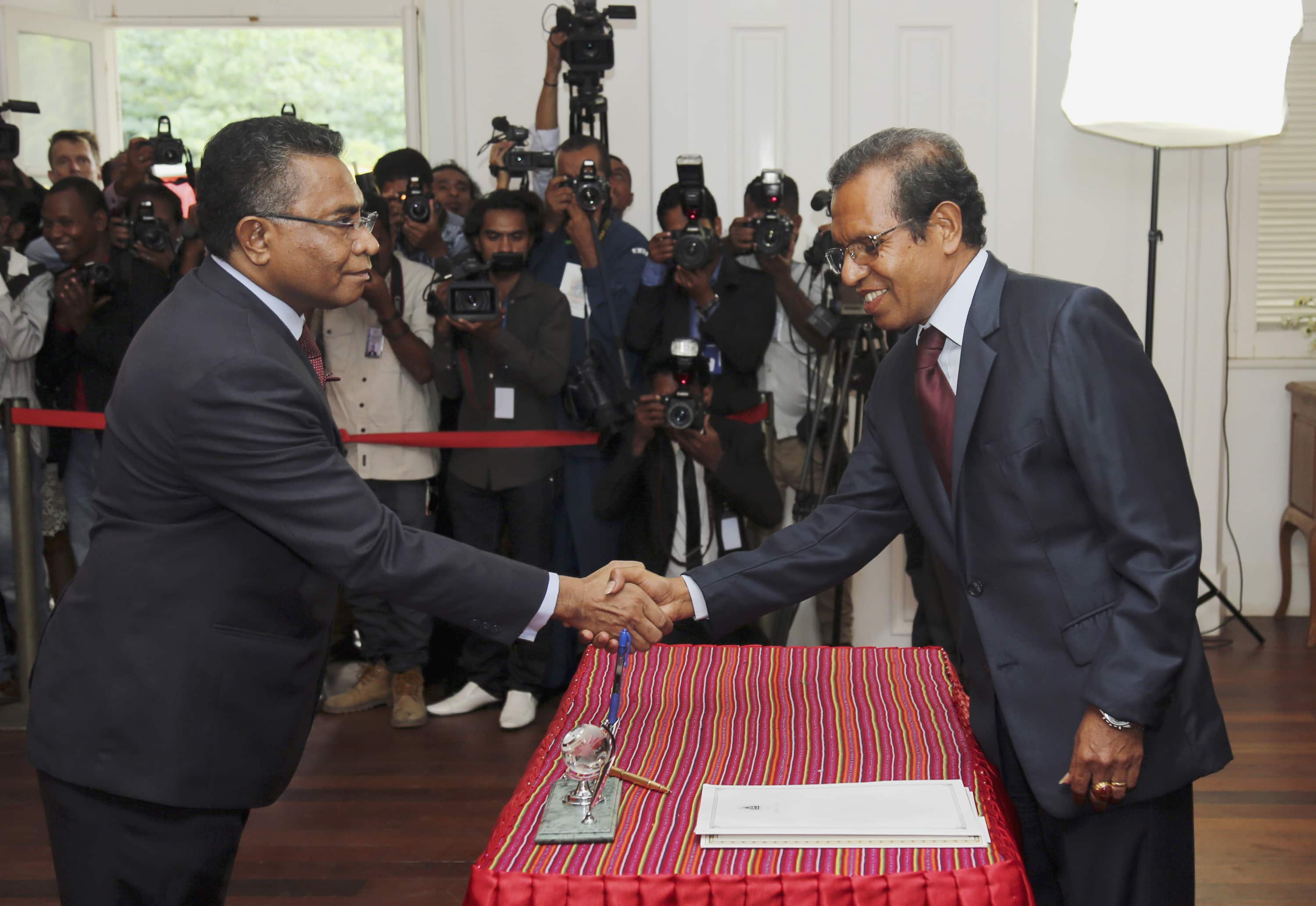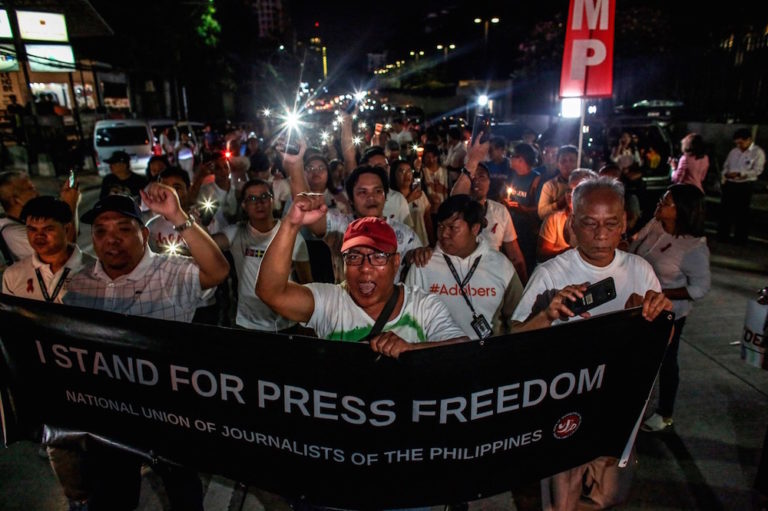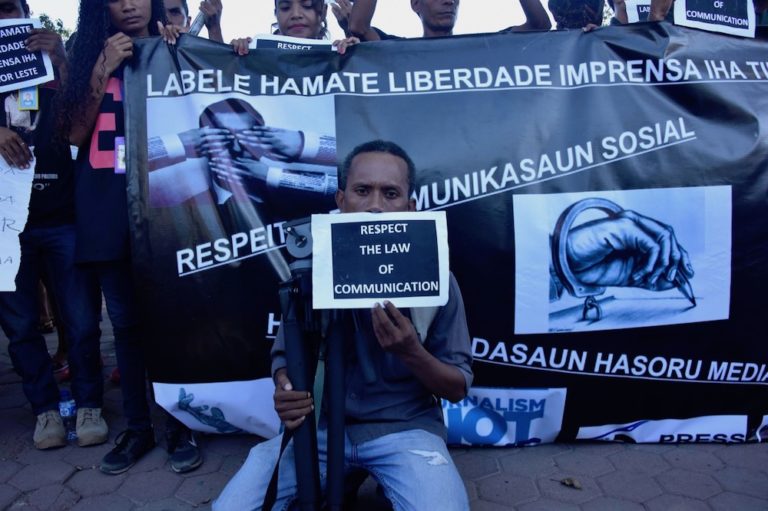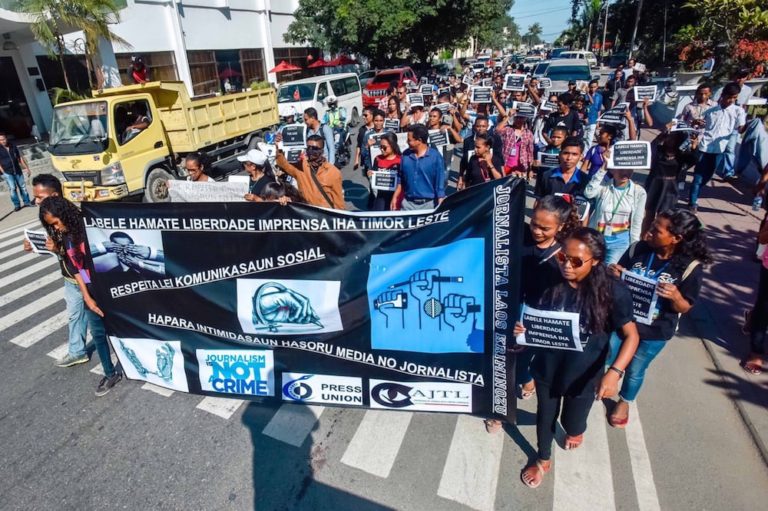While no journalist has been jailed for their work, press freedom and journalist safety in Timor-Leste are constantly under threat, mostly from politicians. Moreover, a new Press Law has been in place since the beginning of 2015.
This statement was originally published on seapa.org on 8 May 2015.
By Asosiasaun Jornalista Timor Lorosa’e – ATJL
Having enjoyed freedom of the press and freedom of expression in the past 10 years as guaranteed under Timor Leste Constitution’s article 40 and article 41, the 5th Constitutional Government established in 2012 the office of the Secretario Estadu Komunikasaun Sosial (Secretary of State for Social Communication or SECOM) as its arm responsible for the media.
While no journalist has been jailed for their work, press freedom and journalist safety in Timor-Leste are constantly under threat, mostly from politicians – both government officials and parliamentarians.
For example in 2013, two journalists were sued, convicted and fined because of their reports about corruption by a state prosecutor. In the months of March and April 2015, there were four cases of beatings of journalists, mainly by police officers who were not satisfied with stories in the news publications and who misunderstood the role of journalists.
On 20 October 2014, the parliament issued a resolution condemning media in Timor Leste for re-publishing a news article originally published by Indonesian online media that wrongly quoted Prime Minister Xanana Gusmao in an interview during his visit to Jakarta.
To protect or regulate
The Timor-Leste Press Law was approved by the President and has been in place since the beginning of 2015.
The new law establishes a Press Council as an independent body for media self-regulation. The Press Council is composed of two representatives from the journalistic community, one representative of media owners, and two representatives from the public. The National Parliament will endorse the two public figures that will be representing the public in the council.
During its deliberations of the law, the Asosiasaun Jornalista Timoe Lorosa’e (Timor Leste Journalist Association, or AJTL) strongly recommended that the public figure members of the council be selected by the representatives of journalists and media owners. Such a process would guard against possible political interference from government and politicians. However, this proposal was ignored by the members of the National Parliament’s Commission A which finalised the bill.
The imposition of the media law, despite calls to review the draft, threatens freedom of the press and the safety of journalists in Timor-Leste. As the government prepared to approve the Press Law, the International Federation of Journalists and AJTL issued a joint statement saying, “this law in its current form, this would indeed present a deplorable outcome for democracy in East Timor and the functioning of local media and international media.”
Jane Worthington, IFJ Asia Pacific Acting Director said, “These unacceptable laws… show the Government’s attempts to limit the ability of journalists to freely report.”
The IFJ and its affiliate AJTL called on the national parliament to urgently review the press laws which, in their current form, will drastically endanger the operation of the media and press freedom in the fledgling democracy.
“We are greatly concerned for the freedom of the media and journalists’ ability to report in East Timor should these laws proceed,” Worthington said. “Particularly concerning is that the government of East Timor has repeatedly ignored the protestations of East Timor’s media and neglected to accommodate key concerns within the law since it was first proposed last year.”
Concerns over regulation
The law provides restrictions on who can be called a journalist in East Timor, with a definition applicable to citizen journalism, including in social media.
One of the main concerns of the AJTL regards Article 14 of the law which clearly mandates: “Access to the profession of journalism begins with a mandatory internship, to be completed successfully, with a duration of eighteen, twelve and six months, respectively, for those with secondary education, Bachelor degree in another subject, and in media areas.”
The media council is given the powers to approve and certify journalists.
Also, foreign journalists would only be able to report in the country with government authorisation.
Worthington reminded the government that “We should also not forget that 38 years ago, six Australian-based journalists were killed while attempting to reveal Indonesia’s secret invasion of East Timor. These laws would bar foreign journalists unless they receive government approval to report in the country.”
The Press Law lacks a complaint system for abuses against the media, such as violence and threats, although such incidents cannot be handled by the press council as it might endanger the journalist’s duties. On the other hand, the law also imposes fines on breaches of the law, including those concerned with the conduct of journalistic work.
The media law also limits foreign ownership of media, however this was not considered as unconstitutional by the President when he signed the law. Currently most media in Timor Leste are owned by Timorese politicians and business elites. The investment law restricts foreign shares in a national company to not more than 50 percent.
Finally, the Press Law also provides for a single code of ethics which will bind all journalists in the country.
High growth, low development
The Press Law takes effect over the information and communication industry that has seen the highest growth rates compared to other sectors in Timor Leste recently. For instance, the sector grew by 19.6% in 2012.
However, despite this growth, media in general tends to be small and underdeveloped.
Currently, there are only three daily newspapers with an average circulation of only 1,000 each and they are only concentrated in Dili. Three tabloids, with similar circulation numbers, are also concentrated in the capital.
Meanwhile, RTTL is the only public radio and TV broadcaster, while there are more than 20 community radio stations and one political party radio. Two online news websites serve the increasing number of internet users. mobile phone and internet users. Like in the rest of the region, social media is also growing in Timor Leste – particularly Facebook and blogs as a growing medium for discussion and debates.
Capacity and welfare
The rapid growth of the media industry in Timor Leste has not been accompanied by an improvement in journalists’ capacity and welfare.
Journalists in the country receive an average of 125 USD per month, which is just 10 USD above the mandated minimum wage under Timor Leste Labour Law. This salary is often received without any additional benefits from media companies.
Government officials and politicians often criticise journalists for their low skills and quality of reporting. On the other hand, media owners have shown no interest in strengthening the capacity of the journalists, or at least in recruiting better journalists by providing better salaries.
In 2013, media owners started to receive funding from the government to improve their managerial capacity. However, this fund has not directly improved the quality of the journalism. AJTL has urged the Secretary of State for Social Communication (SECOM) to stop providing financial support to media companies since this can also jeopardise media independence.



